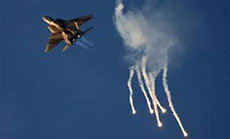’Israel’s’ Aggression on Syria: Failure in Results

Hassan Ibrahim
"Israel's" attack on Syria near its capital Damascus is part of the ongoing war between Hizbullah and the Zionist entity and concerns what Tel Aviv dubs as "strengthening".
 Due to the war on Syria and the war raging thereat for Syria, "Israel" took advantage of the Syrian army's preoccupation in fighting terrorism and different armed groups to draw what it also calls the three "red lines" which it has defined more than once: The transfer of game-changing weapons to Hizbullah in Lebanon, damaging "Israeli sovereignty", and the transfer of chemical weapons within and from Syria. The latest attacks are classified within the first of the three red lines stated in this equation.
Due to the war on Syria and the war raging thereat for Syria, "Israel" took advantage of the Syrian army's preoccupation in fighting terrorism and different armed groups to draw what it also calls the three "red lines" which it has defined more than once: The transfer of game-changing weapons to Hizbullah in Lebanon, damaging "Israeli sovereignty", and the transfer of chemical weapons within and from Syria. The latest attacks are classified within the first of the three red lines stated in this equation.
The measure of the "Israeli" strategy's success is to be seen from the results strategy's execution. Was Tel Aviv able to stop the transfer of game-changing weapons to Lebanon? And was it able to put a stop to the Syrian Army's success in fighting armed groups and terrorism? Was the execution of these attacks a goal in its own merit or is the goal the result thereof?
A number of questions arise here at:
First: It would be wise to point out that the ongoing and future changes in the "Israeli" entity, including the manifestation of the identity and form of the next military leadership, or the fall or toppling of the government, and the progression towards Knesset elections do not indicate "Israeli" constraints in executing attacks, be it in Syria or other axes of engagement, be they of a military or security nature. The resigned or toppled or expired government and the soon to be expired military leadership will not lose their jurisdictions, which will remain full, be it with regards to the decision of launching attacks or their execution. The matter shall remain within the framework of what is possible, the benefit thereof, estimation of success, and to measure them against the estimated price thereof.
Second: It would be also wise to point out that the personal benefit of the current "Israeli" Prime Minister Benjamin Netanyahu in the current struggle in "Israel" over the elections and right-wing voters in the entity is not the direct cause of the aggressions, particularly the latest one on Syria. Yes, Netanyahu could make use of the timing, but the decision and execution is linked with the war on the strengthening of Hizbullah and the resistance in Lebanon. The rest of the causes and results are to be seen within the context of the attacks.
Third: Tel Aviv is well aware that the only level on which it can work, albeit within a restricted framework and in accordance with the prevention of "strengthening" policy is only in Syria. It can longer be drawn into other battles, specifically not to Lebanon. In the past, "Israel" has attempted that when it tried to join Lebanon with its Syrian battle as a field of operations for its war machine, which happened in its last aggression on one of the resistance's sites near Janta, in the Bekaa valley. However the reply to this operation laid an end to Tel Aviv's attempts to target Lebanon.
Supporting this claim is "Israeli" Channel 10 reporter Or Heller confirmation that the targeting of the rocket shipment in Damascus came shortly before its transport into Lebanon and its crossing the border, and "if that happened, the game would have been more complicated for the "Israeli" Army". Some articles written on the day after the attack also support this, as Maariv's senior military analyst Amir Rapaport wrote "Syria yes...Lebanon no."
Fourth: Arab and Lebanese journalists are mistaken when they say that the "Israeli" strike near Damascus decreased the influence of the deterrence of the Sheb'a farms operations as well as other recent similar retaliatory operations on the attacks in Janta and the ‘Adloun charge. The mistake lies in the fact that the two fields of battle are different, and so is the framework of Hizbullah's reply against "Israel". The resistance and its leader have clearly and publicly states that any targeting in the Lebanese arena will be met with retaliation. This declaration and the retaliations kept the enemy from pursuing its assaults in Lebanon. As such, the assault in Syria has nothing to do with the equation that Hezbollah has established with regards to Lebanon.
Fifth: This may be the most important part of this approach: Was "Israel" successful in its policy of preventing Hizbullah from gaining military power through its attacks in Syria, which by the way is the 8th assault in a two year period? This question raises many answers, the most important of which came from Israeli media, as a kind of admission of result:
The Zionist government's strategic affairs minister, Yuval Steinitz, had indirectly stated the strategy is a failure, as he said in the aftermath of the latest strike on Syria: We will continue our airstrikes to prevent the strengthening of Hezbollah in Lebanon "as much as possible". This last portion alone signifies failure.
Senior security analyst commentator in the Yedioth Ahronoth website, Ron Ben Yishai, comments on the strikes saying "despite all of the strikes in Syria against Hizbullah's strengthening, it is estimated that a good number of shipments, of the same caliber as the ones targeted recently, were in fact transported into Lebanon, unnoticed by "Israeli" intelligence". In the Yedioth Ahronoth editorial it was also said that "Despite everything, we must point out the successes and frustrations achieved by "Israel" through these air strikes. This is nothing but a drop in the sea, because Hizbullah was able to empty almost all kinds of weapons belonging to the Syrian army and transport them to its stores. The "Israeli" army must take into account that in Lebanon's third war, the army will face an organization with the capabilities of a state, which will turn the coming war into one that is very complicated."
In the past, the leader of the northern front in the "Israeli" army, and the army's next chief of staff, stated in June 2010, in the national security research center in Tel Aviv that: "we have learned that there is great difficulty in preventing organizations of stockpiling and strengthening their military power, and this is a very difficult task, specifically when facing an organization like Hizbullah in Lebanon". He added: ""Israel" may have the ability to deter Hizbullah from making use of his capabilities (within the context of mutual deterrence), but at the same time it's difficult for it to put an end to its strengthening, keeping in mind that these attempts must remain ongoing."
Will "Israel" refrain from targeting the resistance's strengthening in Syria? Definitely not, but will "Israel" reap any actual rewards and prevent this strengthening? Also definitely not.




